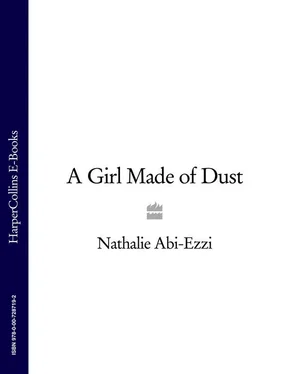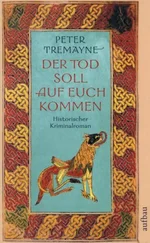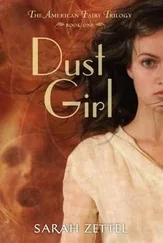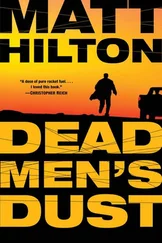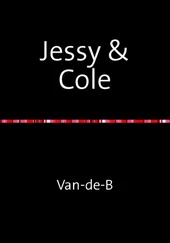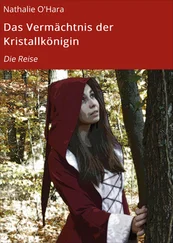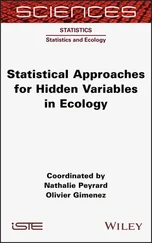‘What happened?’
‘I fell down that ledge in the forest, the steep one.’ I pointed the short distance down the slope to where the trees were singing, their chirps stitched together in an endless row. The forest was the best place to be, with its green pine needles and grasses, its brown trunks and rock, its bright coloured flowers, gleaming insects, thorn bushes, and the dry red earth of its narrow paths. ‘The skin tore as I slid down. There are still bits of grit in, see?’ I poked at the black specks on my knee.
Naji's eyebrows rose as if he didn't believe me.
‘I did! I tried to get hold of some roots but I couldn't.’
‘What was at the bottom, if you fell?’
‘There were all sorts of things – twigs and a rusty can and pine cones.’ My fingers still smelt of the young cones that had been all hard and green with a silver diamond on each scale. ‘And then I found …’
His eyes lit up. ‘What?’
‘Nothing. When I got back and you and Mami weren't here, I went to Teta's, and she touched me all over to check that every bit of me was still there. It tickled! And there was blood on my shirt from the cut on my shoulder. It looked like a flower – it got bigger…like a rose! – and then Teta put spirit on my scratches, which hurt even more than falling over.’
But Naji was two years older than me and wasn't interested in such things. He went inside. When he came back he was carrying a Matchbox car, his bag of marbles and the blue tin box that lived on the top shelf of his bookcase where I couldn't reach. He kept his most precious things in it.
‘Teta said it was the Virgin who stopped me dying when I fell.’
He stroked the little white sports car. ‘It's a Lamborghini. Look.’ He flicked the doors so they opened upwards, then closed them again.
‘Do you think it's true, Naji?’
He ran the car quickly across one palm so the wheels whizzed. ‘No. The Virgin Mary's not here at all. Didn't you hear how they saw her in a building site in Beirut?’
‘Who saw her?’
‘Just people. Gabriel's mother told us. She said miracles were happening just twenty kilometres down the road from here in Beirut.’
‘But Teta doesn't lie.’
He shrugged.
A rumble of shelling was coming from somewhere as Naji emptied his pockets to see if there was anything precious to add to the box. There was a long piece of string with knots tied in it, his old penknife, a little block of wood with a hole bored through it, a round of caps and some more marbles.
‘I've got a marble too,’ I said.
Naji's black eyebrows lowered. ‘Where is it? When did you get it?’
‘Today. I found it.’ It was still in my pocket, warm from being against me all afternoon. ‘Here!’ I plopped it into his hand.
He gasped. The glass eye jumped up and down twice in his palm, and I sat on my heels and laughed.
‘Where did you get it?’
I told him how I'd found it in the forest, and he turned the eye over, examining it closely. It looked funny lying in his hand without a body round it, and I thought about people being made up of separate parts – ears and fingers, hair and belly-buttons.
‘Do you think it's hers?’
He glanced up. ‘Whose?’
‘ Hers! ’
He peered more closely, as if it might have her name on it. ‘The witch?’
I nodded.
‘Probably.’
Ever since we were old enough to think, we'd known she'd put a spell on Papi to make him the way he was.
‘I know!’ I cried. ‘It's the evil eye!’
Naji looked doubtful. ‘Maybe.’
‘She's probably got more than one so she can swap them round depending who she wants to put the evil eye on. Big eyes for big curses and little ones for smaller curses – a drawer full, all rolling about when she opens it!’
Naji sighed, which meant he didn't think I knew anything. ‘There's only one evil eye,’ he said, ‘but if it is hers she can't put a curse on us because we've got it.’ His face lit up. ‘Like a miracle. Miracles are always happening.’
‘What other miracles happen?’
He put the glass eye to his, maybe to find out if he could see with it. ‘Mar Sharbel.’
‘What's he ever done?’
‘He's our saint and there's always stuff about him, how sick people get better.’
The rumble of shelling that was always in the background came again, carried on the still air. ‘How?’
He waved his hand, as if there were too many instances to remember. ‘If they're blind they grow new eyes, or new legs if they can't walk.’
But we weren't missing any legs, arms, eyes or even teeth. We were only missing Papi.
Mami talked to herself – made noises, her face twisted or frowning or sad: the slight sucking in of breath when she cut herself, the annoyed ‘ tut ’ when she was rolling up fatayir into parcels and the dough wouldn't stick together, the ‘ ach ’ when she straightened up from making beds, the long sigh like the sea when she sat down at the end of the day. She even talked to the chicken when she was preparing it for the oven, sympathetically as if she was sorry. And then there was the sound of her: the rustle of the underskirt against her legs, the clack of her wooden slippers, the tinkling of her two gold bangles, the click of her hips as she shifted from one foot to the other, the tiny tick when she bit down on hairpins while coiling her hair.
Papi didn't make these noises. He was as quiet as a stone.
Perhaps Mami liked to cook because the kitchen talked back to her: the bubble and hiss of the pots, the crushing and chopping that came from the board, the clatter and tinkle of knives and glasses, the creak of the table, the whirr of the fridge, and the tlup-tlup-tlup of the dripping tap.
Naji must have left footprints when he left to go to Gabriel's because the stretch of kitchen floor between the dining room and the veranda door was newly cleaned and wet. I almost sent a tray crashing to the white-tiled floor.
‘Be careful, ya Ruba!’
There were trays everywhere – along the counter and gas hob, on top of the fridge, on two chairs Mami had brought in from the dining room – all covered with pastry dough.
‘Why are you cooking so many?’
Mami's face was red from the heat as she wiped her hands on a cloth. ‘They won't make much in the end.’ Sweat had settled on her upper lip, and she wiped it off with a downward sweep of her forefinger.
‘Are they all the same?’
She nodded and started to roll out a new square. Then she lifted it onto her knuckles and, elbows spread sideways, stretched it so thin I could see her face through it. Three times it tore and had to be mended, but finally she cut it up and piled layers of dough on top of each other, brushing them with butter and sprinkling nuts as she went. Several ripped, and a ragged ball of useless skin-like pastry grew.
‘Here – chop these nice and fine.’ Flour smeared her face as she brushed her hair back with her arm.
It was hard to chop the pistachios. One flew up and hit the saint on the calendar that hadn't been turned for two months. Another spun out onto the floor.
‘Patience. Patience will extract sugar from a lemon.’
I rolled a nut between my fingers. ‘How?’
But she didn't answer. Two trays came out of the oven and two more went in, the layers of filo like dragonfly wings that crackled when I touched them.
Mami wasn't taking any notice. Bent low, she was arranging more pastry on a tray; like that, her hair looked like a giant snail sitting on the back of her head. Then, as I stepped up close, her eyes widened. ‘Ruba, what happened?’ A loose strand of her hair tickled my cheek as she leant down, her eyes round and black-rimmed. The light from the window showed specks of flour floating next to her ear in the thick heat.
Читать дальше
